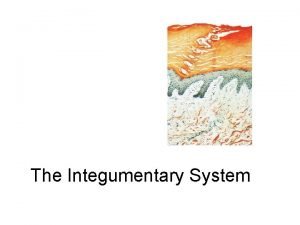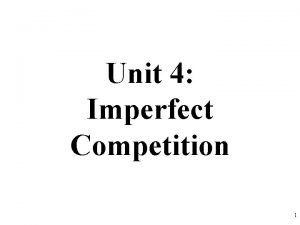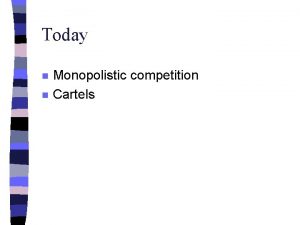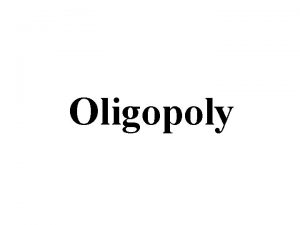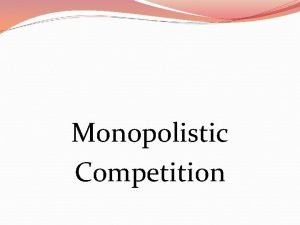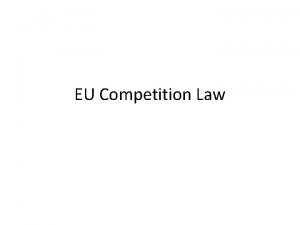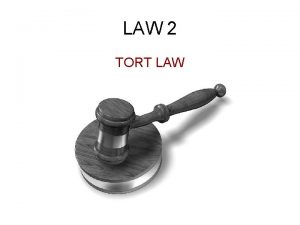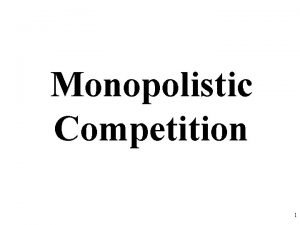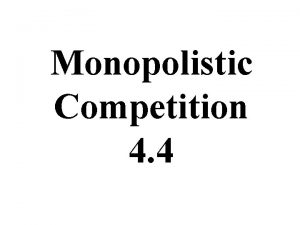EU Competition Law Introduction Competition law protects competition


















- Slides: 18

EU Competition Law

Introduction • Competition law protects competition in a free market economy, that is, an economic system in which the allocation of resources is determined by supply and demand is not directed by government regulation. • Competition is believed to deliver efficiency, low prices, and innovation. • Adam Smith (The Wealth of Nations, 1776) identified the “invisible hand” of competition as a force leading to the general good.

The objectives of Competition law • A. The most important objective is economic efficiency. • A perfectly competitive market is one in which there a large number of buyers and sellers. All have perfect information, and there are no barriers to entry or exit. • This market is said to lead to allocative efficiency (goods are produced in the quantities valued by society), to productive efficiency (goods are produced at the lower possible cost), and to dynamic efficiency (the market delivers innovation and technological progress).

Perfect and workable competition • In the real world perfectly competitive markets hardly ever exist. Most markets lie somewhat between perfect competition and monopoly. (Workable competition, the rules should aim to produce the best competitive arrangement practically attainable). • B. Others goals for Competition law • a) Avoidance of the creation of excessive private power. It decentralizes and disperses private power. It protects individual freedom (liberal democracy). • b) Protection of small business from big business. Instead of protecting competition, it protects the competitors. It can be seen as fair than free competition.

Other policies • c) It may be used to service other policies, such as social, employment, industrial, environmental and regional policy (by prohibiting mergers which will cause job losses, or allowing restrictive agreements which will protect environment). However, the pursuit of such policies may be incompatible with the pursuit of efficiency.

The objectives of EU competition law • 1. The accomplishment of the tasks entrusted to the EU, and in particular, the functioning of the internal market. An internal market is an essential condition for the development of an efficient and competitive market. Market integration have to be promoted. • 2. The maintenance of competitive markets. It is an instrument to encourage industrial efficiency, the optimal allocation of resources, technical progress and the flexibility to adjust to a changing environment.

The prohibition of collusion between undertakings • Article 101 para 1 precludes restrictive agreements between independent market operators, whether “horizontal” (between parties operating at the same level of the economy) or “vertical” (different levels, agreements between a manufacturer and its distributor). • This prohibition may be declared inapplicable to an agreement which fulfils four criteria, two positive and two negative (para 3). • Provisions in an agreement that contravenes para 1 are automatically void where the agreement does not meet the conditions of para 3.

The notion of an Undertaking • Undertaking is every entity engaged in an economic activity, regardless of the legal status of the entity or the way in which is financed. • Entities performing tasks in the public interest fall outside the scope of the rules (for instance, a local authority carrying out an administrative duty, such as granting concessions for funeral services). • Economic activity means an activity making profits. • The European Organization for the Safety of Air Navigation (Eurocontrol) is not an undertaking. It exercises powers relating to the control and supervision of air space which are typically those of a public authority.

The meaning of agreement, decision and concerted practice. • Agreement must be founded upon “the concurrence of wills between economic operators on the implementation of a policy. • Decisions by associations of Undertakings: any coordination through a trade association (resolutions, recommendations, certification schemes). • Concerted practice: any concertation between the undertakings which should be practiced or implement in the market. It aims at the removing in advance any uncertainty about the future conduct of the competitors.

Legal and economic approach • Agreements are not prohibited unless they prevent, restrict, or distort competition. • The agreement must affect the free play of competition to “an appreciable extent”. EU law is not concerned with agreements concluded between parties that hold a weak position on the market. • Commission note on agreements of minor importance (2001). The notice uses market share thresholds to quantify what is not likely to be an appreciable restriction of competition. The market share held by the parties to the agreement must not exceed 10 per cent of the relevant market.

Inapplicability (economic progress) • However, in the past the Court of Justice adopted a teleological interpretation, taking into account of certain “policy-linking” clauses, such as environmental protection, employment, culture, health, consumer protection, industrial policy and the elimination of regional disparities. • The same attitude was adopted by the Commission. In its decision Ford/Volkswagen (1993), the Commission noted, in exempting the agreement, that the joint venture would lead to the creation of a number of jobs and substantial foreign investment in Portugal. It is estimated to lead, inter alia, to creation of about 5. 000 jobs and indirectly create up to another 10. 000 jobs, as well attracting other investment in the supply industry.

The 4 criteria • The first criterion is that the agreement leads to an improvement in the production and the distribution of goods and services, as well as to a promotion of technical and economic progress. • This first condition refers to efficiency gains, including cost and qualitative efficiencies. • These efficiencies could be resulted from: 1) development of new production technologies and methods, 2) economies of scale and scope, 3) better production planning. • Parties can not rely on broader public policy benefis achieved by the agreement. It is submitted that the Commission must evaluate an agreement under an economic point of view. Political considerations are not to be taken into account.

The negative criteria • The second criterion. Where consumers are forced to pay a higher price without attaining other benefits from the agreement, this criterion will not be satisfied. As to the other benefits, one could designate the improvement in distribution and the offer of more qualitative products. • The third criterion requires that the agreement must only contain restrictions which are indispensable to the achievement of the benefits shown to result from the agreement. This condition is an application of the general principle of proportionality. • The Commission states that restrictions that are black listed in block exemptions regulations, such as the fixation of the prices, or the conferment of absolute territorial protection, violate this principle.

Elimination of competition • The forth criterion requires that the agreement must not lead to the elimination of competition. • The Commission states that ultimately the protection of rivalry and the competitive process is given priority over potentially pro-competitive efficiency gains which could result from restrictive agreements. • In other terms, when competition is eliminated the competitive process is brought to an end and short term efficiency gains are outweighed by longer-term losses stemming inter alia from expenditure incurred by the incumbent to maintain its position (rent seeking), misallocation of resources, reduced innovation and higher prices.

Enforcement • The Commission may take a number of decisions, including decisions ordering terminations of infringements, imposing fines, or accepting commitments. It can impose behavioural or structural remedies. • The Commission pursues an increasingly aggressive policy towards the detection and punishment of cartels. It operates a “leniency policy” whereby participants in cartels are given immunity or a reduced penalty in exchange for providing the Commission with information about the cartel and their co-conspirators. The Commission imposes heavy fines on undertakings found to have committed serious breaches on the competition rules.

Factors of imposing fines • For each undertaking participating in the infringement, the fine shall not exceed 10 per cent of its total turnover in the preceding business year. • The Commission takes into account a number of factors, such as the knowledge and intention of the parties, the nature and gravity of the infringement, the duration of the infringement, the degree of cooperation with the Commission, uncertainty about the illegality of the conduct concerned and the willingness of the infringer to accept undertakings to remedy the situation.

Judicial control • Commission decisions can be challenged before the Court in an action for annulment. The Court has unlimited jurisdiction in respect of fines imposed by the Commission in competition cases. • Since 1989 actions in competition case have gone first to Court of First Instance (now “General Court”) with an appeal on a point of law to the ECJ. • As the Commission is not a tribunal, the supervision by the Court must satisfy the requirement for a fair and public hearing before an independent and impartial tribunal if the competition proceedings are to comply with the European Convention of Human Rights.

Limits of the control • The ECJ (2004) stated that “examination by the EU judicature of the complex economic assessments made by the Commission must necessarily be confined to verifying whether the rules on procedure and on the statements of reasons have been complied with, whether the facts have been accurately stated and whethere has been any manifest error of appraisal or misuse of power”. • Review under Treaty entails ensuring that the Commission has properly interpreted the law. The great leaps forward which the Commission has made in the interpretation of the EU competition rules have usually been confirmed by the Court: for example, the finding that Article 101 applied equally to horizontal and vertical restraints, the extension of the abuse concept to cover mergers and the development of the doctrine of collective dominance. • The Court is committed to interpreting the EU law in a way which gives effect to the objectives of the Treaties.
 The atmosphere protects earth from
The atmosphere protects earth from Transparent eye layer that protects iris and pupil
Transparent eye layer that protects iris and pupil Mis bidgoli
Mis bidgoli The atmosphere protects earth from
The atmosphere protects earth from Cardiac output
Cardiac output Foot protection equipment
Foot protection equipment A thin fold of skin that covers and protects the human eye
A thin fold of skin that covers and protects the human eye Atmosphere unit
Atmosphere unit Which part of the plant carries and protects the seed
Which part of the plant carries and protects the seed Epithelium which protects inner part of the body is
Epithelium which protects inner part of the body is What protects cushions and insulates the skin
What protects cushions and insulates the skin Characteristics of monopoly
Characteristics of monopoly Perfect competition vs monopolistic competition
Perfect competition vs monopolistic competition Pure competition vs monopolistic competition venn diagram
Pure competition vs monopolistic competition venn diagram Perfect competition vs monopolistic competition
Perfect competition vs monopolistic competition Newton's first law and second law and third law
Newton's first law and second law and third law Newton's first law and second law and third law
Newton's first law and second law and third law Boyles law
Boyles law Avogadro's law constant
Avogadro's law constant










